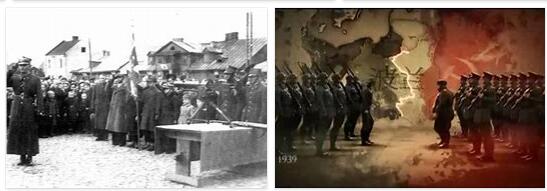According to healthvv.com, the union between the two states therefore remained only personal, but since the agreements of 1401 (a first rapprochement between the cousins took place in 1392) also took part in the Polish aristocracy and the Lithuanian boyars, it already contained within itself the germs of future developments. This was demonstrated shortly after the common struggle against the common enemy, the Teutonic Order, which at Grunwald (1410) ended with the crushing victory of the Polono-Lithuanian allied armies. The victory was not conveniently exploited, and the crusaders soon recovered, heroically resisted in their castle of Marienburg and in 1411 concluded with the Poles a very dignified peace, with which they returned, and only temporarily, Samogitia to Vitoldo, but retained full sovereignty over their entire territory. The subsequent campaigns had the sole effect of making the sale of Samogitia definitive.
Yet the effects of Grunwald’s victory were not long in making themselves felt, partly unexpectedly, in a threefold direction. First of all, Poles and Lithuanians understood the advantages deriving from their recent alliance, and in the Horodło conference (1413), while leaving intact the juridical-political relationship between the two states, a true brotherhood was reached between the szlachta and the Lithuanian-Ruthenian boyars. and a promise of future mutual aid. Secondly, the prestige of the Agellonian state increased strongly throughout the West and at the Council of Constance the Poles were able to strenuously fight and repel the violent attacks of the Crusaders and affirm their own thesis of the immorality of any violent expansion of Christianity.
Meanwhile, relations between the two cousins Vladislao and Vitoldo were excellent, although the latter in his successful policy closely followed Lithuanian interests. Attempts to disturb these relations and to destroy the Union, undertaken repeatedly by the Teutonic Order and by the emperor Sigismund himself, did not have any positive results even for the vigilant defense of Polish interests by the powerful aristocracy of Lesser Poland which prevented the another is the coronation of Vitoldo, planned by the conference in Łuck (1429). To this aristocracy and especially to its leader, the bishop of Krakow Zbigniew Oleśnicki, we owe the Polish policy in the face of Hussitism. The adoption of the szlachta for the Germans, the animosity against the over-centralization of power in the hands of the high clergy initially favored the spread of Hussitism in Poland. On the Bohemian side, the crown was even offered to Jagiellon who refused it, and to Vitoldo who accepted it, sending Prince Sigismund Korybut (1422) to Prague as his lieutenant. But then, partly because of the resistance of the radical Taborites and still more because of the opposition of the intransigent Catholics of Krakow, not only did this project of a Bohemian-Polish-Lithuanian dynastic union not take place, but vigorous action was taken against the Polish Hussites: with ordinances (statute of Archbishop Trąba of 1420, edict of Wieluń of 1424) and with arms.
Shortly afterwards Vitoldo (1430) and Jagellone (1433) died at a short distance from each other. Their deaths severely weakened the Union. The Lithuanians tended to a complete separation, and this tendency was indirectly facilitated by the young age of the new king Vladislaus III (1434-1444) and by the too daring, but not always happy, projects of the powerful Oleśnicki. But he managed to procure the Hungarian crown for his protégé (1440), but his plan to free Europe, with the concerted effort of Hungary and Poland, from the Turkish threat tragically failed in Varna (1444) with the defeat and death of the heroic king. It is therefore not surprising that Casimir, Vladislao’s younger brother,
Having agreed to the east with Muscovy – whose power was constantly increasing – on the basis of the status quo (1449), Casimir immediately turned his sights on Pomerania and Prussia, also pushed to this by the Prussian League, who, desiring the freedoms enjoyed by the Poles for their lands, spontaneously submitted to Poland. In 1454 the deed of incorporation of Prussia was signed in Krakow, and immediately afterwards the campaign against the Crusaders began, who, due to their unexpected strength of resistance (the Order, as well as the Poles, had resorted to mercenary troops), for the lack of understanding that the Polish nobility showed also on this occasion – they exploited the situation to obtain new privileges for themselves in Nieszawa – for the Baltic problem, it lasted 13 years and only in 1466 did it end with the peace of Toruń. Pomerania with Danzig, which during the war had fought fiercely against the Teutons, the land of Chełmno, some areas of Prussia with Elbing, Marienburg and the bishopric of Warmia (Ermeland), passed under Polish rule;
Thus Poland, while only partially solving the serious problem of its northern borders, regained access to the sea after a century and a half: the resulting economic advantages were enormous and immediate, while the political ones were limited and unstable.
The second part of Casimir’s long reign was determined by dynastic concerns and ambitions rather than by real national interests. Husband of Elizabeth of Habsburg, sister of Ladislao the Posthumous, Casimir, after his death, claimed rights on the thrones of Bohemia and Hungary. After long negotiations and struggles, his ambitions were satisfied: his son Ladislao succeeded in 1471 to George Poděbrady, king of Bohemia, and in 1490 to Matthias Corvinus.
